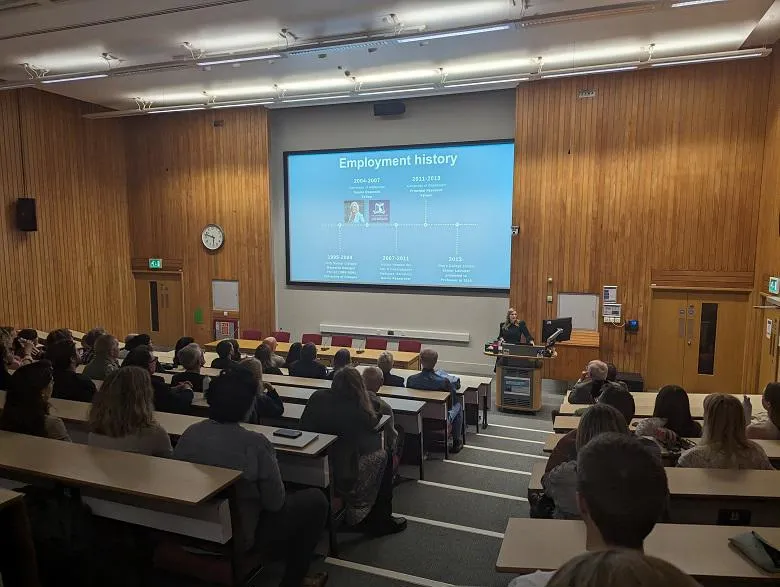29 May 2024
Professor Gail Gilchrist delivers her inaugural lecture at IoPPN
On Thursday 16 May 2024, Professor Gilchrist delivered her inaugural lecture as Professor in Addictions Healthcare Research at King’s IoPPN.

Professor Matthew Hotopf, Executive Dean at the IoPPN opened the evening, highlighting that inaugural lectures are a celebration of academic life at the key moment of someone’s career as they become a Professor. He goes on to explain that the IoPPN tackles a diverse range of nuances of mental health, with the goal of affecting real world and policy change, emphasising that Professor Gilchrist’s research tackles hugely important societal issues, encompassing many facets of study.
Professor Gilchrist began her lecture with an overview of her life and career, looking back to her early childhood in Glasgow with her elder sister, and growing up in the 1980s with a group of friends she is still close with. Following school, Professor Gilchrist attended Glasgow Polytechnic, as it was named at the time, to study an undergraduate degree in Psychology. Not long after graduation she went travelling through Europe, and found herself teaching English in northern Spain for several years. Upon returning to Scotland, she took on a postgraduate certificate at University of Strathclyde, eventually finding a job in research in the NHS shortly after. She worked in research in the NHS for 10 years and during this time she completed a PhD part-time at the University of Glasgow, then moving across the world as Senior Research Fellow at the University of Melbourne, returning to Spain to work as Senior Researcher at Institut Hospital del Mar D’Investigacions Mediques in Barcelona before returning to the UK as Principal Research Fellow at the University of Greenwich, joining King’s College London in 2013 and being promoted to Professor in 2019.

Moving on to discussing the focus of her current work, Professor Gilchrist touches on what sparked her interest in looking at addictions, and particularly understanding intimate partner violence in the context of substance abuse. Her research has found that a woman living with a substance user was almost four times more likely to experience intimate partner violence (IPV) than the women in the general population. Continuing her research in this area, this particular statistic kept jumping out at her – that having a partner who uses substances significantly increases the chance of IPV. Her research highlighted that staff working in drug and alcohol treatment services often lacked knowledge and confidence about how to address IPV in their everyday work. This led her to study IPV perpetration by men in the context of substance use to understand the role of substance use and IPV and develop and test interventions to reduce IPV in this group. Professor Gilchrist and her team worked with policy makers and practitioners from both the domestic abuse and substance use treatment sectors and with people with lived experience to build a framework of working safely and effectively with men in substance use treatment settings who perpetrate IPV. She set up an inter-agency Learning Alliance to work with key stakeholders to develop and implement research in this field.
She led the ADVANCE Programme of research, that developed an understanding of how substance use impacts IPV and developed the ADVANCE Programme to develop healthy non-abusive relationships for men in substance use treatment. The most recent step in Professor Gilchrist’s research programme is the ADVANCE-Digital (ADVANCE-D) Programme, which involves individual goal setting sessions, online groups, website practice sessions and coaching calls. The programme also includes supporting the (ex-)partners of men receiving A DVANCE-D, allowing for enhanced risk assessment and case management. The programme was tested on a small scale, finding that men became accountable for their behaviour, seeing a reduction in use of abusive behaviours by 68% of men, and a reduction in the use of controlling behaviour by 40% of men. The team has now received funding to conduct a large trial of men with substance use problems serving community sentences for partner abuse, working with 450 men over the course of 24 months.
Concluding her lecture, Professor Gilchrist thanked her colleagues and students from across King’s and beyond who have aided in the development of ADVANCE. Overall, when reflecting on her career, Professor Gilchrist emphasised that her path has not been a clearly defined linear progression, but a culmination of experiences and understanding that have shaped her both professionally and personally. Throughout her reflections, the impact and importance of family and friendship was clear, with special thanks going to everyone involved in her life, including her rescue dog, Tom!
The vote of thanks was led by Professor Sir John Strang who referred working with Professor Gilchrist as being both a privilege and a challenge over the last eleven years. He applauded her ability to explore both the individual and societal influence of a challenging topic area, and bringing this perspective to the department, where previously this area had not been explored.

